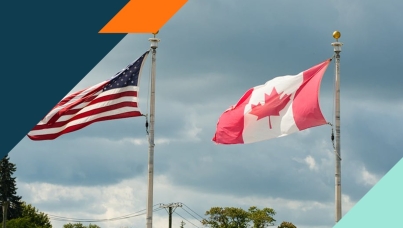Nine in Ten (89%) Canadians Agree that Government Should Invest in Infrastructure to Create Jobs and Keep Economy
Going during Downturn
However, where the issue becomes more contentious is when it is suggested that deficits are run in order to fund these infrastructure investments. Two in three (68%) `agree' (24% strongly/44% somewhat) that `governments should invest in new projects like roads, public transportation and local facilities during an economic downturn even if they have to run a deficit to do so', while one in three (32%) `disagree' (9% strongly/23% somewhat).
That Canadians appear so supportive of infrastructure spending to jumpstart the economy is likely a function of the fact that 15% of Canadians say that they, or someone in their household, is worried about losing their job or being laid off, with job anxiety being highest in Alberta (23%) and Saskatchewan and Manitoba (20%), followed by Quebec (17%), Ontario (14%), Atlantic Canada (11%) and British Columbia (9%). In addition, 7% nationally say that someone in their household has recently lost their job or been laid off.
Thinking about who Canadians think is most responsible for investing in job creation during an economic downturn, a majority (51%) believes that responsibility falls to the federal government. Others believe that large corporations (17%), their provincial government (14% nationally, or 21% in Quebec), small and medium-sized businesses (14%) or their local municipal government (4%) is most responsible for investing in job creation during a downturn.
While most believe it's primarily the federal government's responsibility to help create jobs during a downturn, nine in ten (90%) still `agree' (41% strongly/49% somewhat) that their provincial government should be investing in their community to create jobs', while one in ten (10%) `disagree' (3% strongly/7% somewhat) that the provincial government should be involved in this manner.
Moreover, most (77%) `agree' (22% strongly/55% somewhat) that their `local municipal government can play a big role in helping their community weather difficult economic times'. One quarter (23%) `disagrees' (5% strongly/18% somewhat) that a municipality can have such an impact.
It's often argued that a recession is an ideal time to undertake significant infrastructure investments because low demand for major projects often means that materials are cheaper and labour is more abundant - not to mention that borrowing costs are often lower. On this point, eight in ten (81%) `agree' (31% strongly/51% somewhat) that `governments should invest in new projects like roads, public transportation and local facilities so they can benefit from lower material and labour costs during an economic downturn'. Just two in ten (19%) `disagree' (4% strongly/15% somewhat) with this opportunistic thinking.
These are some of the findings of an Ipsos poll conducted between September 22 and 25, 2015 on behalf of Global News. For this survey, a sample of 1005 Canadians was interviewed online via the Ipsos I-Say Panel (comprising ~150,000 panelists) and non-panel sources (river sampling). Given Ipsos' use of river sampling and a router to match respondents who may not qualify for other surveys with one they do qualify for (such as this poll), it is not possible to identify the number of respondents invited to participate in the survey, or a traditional measure of response rate. Weighting by region, age, gender was employed to balance demographics to ensure that the sample's composition reflects that of the adult population according to Census data and to provide results intended to approximate the sample universe. The precision of Ipsos online polls is measured using a credibility interval. In this case, the poll is accurate to within +/ - 3.5 percentage points, 19 times out of 20, had all eligible voters been polled. The credibility interval will be wider among subsets of the population. All sample surveys and polls may be subject to other sources of error, including, but not limited to coverage error, and measurement error.
For more information on this news release, please contact:
Sean Simpson
Vice President
Ipsos Public Affairs
(416) 572-4474
[email protected]
About Ipsos in Canada
Ipsos is Canada's market intelligence leader, the country's leading provider of public opinion research, and research partner for loyalty and forecasting and modelling insights. With operations in eight cities, Ipsos employs more than 600 research professionals and support staff in Canada. The company has the biggest network of telephone call centres in the country, as well as the largest pre-recruited household and online panels. Ipsos' marketing research and public affairs practices offer the premier suite of research vehicles in Canada, all of which provide clients with actionable and relevant information. Staffed with seasoned research consultants with extensive industry-specific backgrounds, Ipsos offers syndicated information or custom solutions across key sectors of the Canadian economy, including consumer packaged goods, financial services, automotive, retail, and technology & telecommunications. Ipsos is an Ipsos company, a leading global survey-based market research group.
To learn more, please visit www.ipsos.ca.
About Ipsos
Ipsos is an independent market research company controlled and managed by research professionals. Founded in France in 1975, Ipsos has grown into a worldwide research group with a strong presence in all key markets. Ipsos ranks third in the global research industry.
With offices in 86 countries, Ipsos delivers insightful expertise across six research specializations: advertising, customer loyalty, marketing, media, public affairs research, and survey management.
Ipsos researchers assess market potential and interpret market trends. They develop and build brands. They help clients build long-term relationships with their customers. They test advertising and study audience responses to various media and they measure public opinion around the globe.
Ipsos has been listed on the Paris Stock Exchange since 1999 and generated global revenues of e1,669.5 ($2,218.4 million) in 2014.
Visit www.ipsos.com to learn more about Ipsos' offerings and capabilities.



